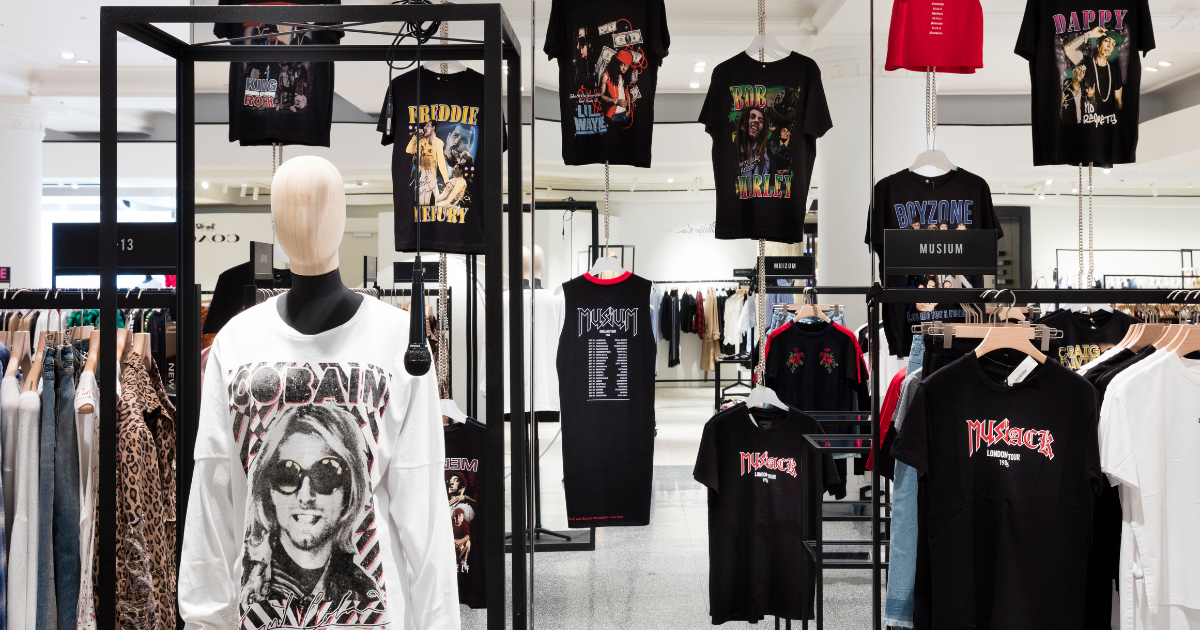
Licensed Music Merch Spreads to New Venues
As music artists resume tours, licensed merchandise is spreading to new venues.
Once limited to the confines of an arena or stadium, music-focused licensed product is increasingly hitting shelves on direct-to-consumer platforms, at pop-ups, and even in standalone retail stores dedicated to artists.
The Rolling Stones, for example, opened a permanent store in London and Universal Music Group’s Bravado is readying a location in Tokyo’s Harajuku fashion district that will feature, based on tour dates, a rotating collection of artist-related merchandise. This will include Bon Jovi and Rolling Stones, Bravado International Group President Matt Young said.
Bravado also fielded a pop-up for the band The 1975 during its tour in Japan last year. And there was a pop-up store in Toronto for Justin Bieber’s Justice World Tour, where 5,000 fans stood in line overnight for exclusive merchandise.
“You have to be smart because pop-up shops don’t always make a ton of money and a lot of times are more about the press and hype. That’s all part of building a brand,” Young said.
For licensed merchandise inspired by music brands, DTC is increasingly becoming a top choice because it is a faster route to consumers than retail stores or concert venues. DTC currently accounts for about 25% of merchandise sales and carries 25% royalties for many artists, according to licensing executives. And unlike tour stops, there is significantly less upfront cost associated with DTC efforts. In releasing Q1 earnings, Universal noted “strong” DTC merchandise sales.
“The online fan is more rabid, and we try to do things that will nurture that relationship with the artists and not take advantage of [the fans] and understand how often to talk to them and what kind of products might make sense,” Young said. “A retail customer is more passive and might be at the mall to hang out and not necessarily be there to go into a store. The Stones’ tongue logo is [iconic] but the placement on the garment, quality of material, and price all varies depending on where it is going within the distribution system.”
As important as all of these avenues are moving forward, tour-driven product sales at arenas and stadiums continue to account for a significant portion of revenue when it comes to music-focused merch. Hoodies have increased in price from a basic $80 version to $150 in some cases by featuring better quality and sustainable materials, and t-shirts have moved into the $35-$40 range from less than $30, licensing industry executives said.
“In many ways, the merchandise business is not release-driven, but it is still tour- and activity-driven and can be quite volatile,” Universal Music Group CFO Boyd Muir said. “If you look at this with a sufficient long-term lens, we definitely see growth for the considerable future for our merchandising business and with the build in the direct-to-consumer, which is an important initiative to us.”
The challenge for business this year will be replicating 2022’s record touring season. It benefited from—in the case of Live Nation Entertainment—shows rescheduled from the previous two years that brought in 20 million fans, CEO Michael Rapino said. North American ticket sales increased 35% in 2022, while in international markets they rose 65%.
This year, Live Nation will be working both ends of the spectrum by offering affordable tickets priced at $25 as well as VIP packages for performers like U2. And with the touring industry’s revenue forecast to increase 8-9% this year, industry executives are optimistic about both merchandise and ticket sales.
“We think the industry is back and bigger than ever,” Rapino said. “We look at this as a long-term, continual growth story.”

















